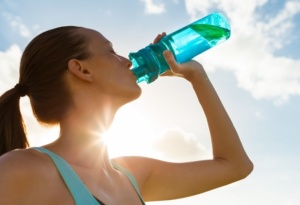
Article by: Banner Hospital
- How To Prevent Dehydration From Crushing Your Workout?
Dehydration is a common but dangerous risk when you work out. We all know that drinking water is a simple way to stay safe while breaking a sweat, but is there more to it? Exercising produces sweat, and the more sweat you produce, the more dehydrated you become. It is important to drink water before, during and after you work out. If you are starting to feel super thirsty during a workout, you are probably already dehydrated or close to it.
Symptoms of dehydration:
Common symptoms of dehydration include:
- Thirst
- Dry mouth
- Infrequent urination with dark colored urine
- Weakness
- Fatigue
- Agitation
- Muscle cramping
- Nausea and dizziness
How to stay hydrated:
It is easy to forget to drink water, so making a schedule can help! The American College of Sports Medicine recommends the following hydration plan for exercisers:
Before:
- Try to drink water throughout the day – start right when you wake up.
- Aim for at least 16-20 fluid ounces around 4 hours before exercise.
- Weigh yourself.
During:
- Drink every time you feel like you are getting thirsty.
- Don’t drink more than around 27 fl. oz per hour – it’s unhealthy.
- Increase the amount of water intake according to extreme weather conditions.
- Drinks with 6-8% carbohydrate (sports drinks) may be beneficial
After:
- Weigh yourself – for each pound lost, 16-24 fl. oz of water is recommended.
- Include fluid intake with meals.
One easy way to keep your body hydrated is to make sure your diet includes water. This doesn’t just mean a glass of water with food – it means eating foods that have lots of water in them already. Adding things like watermelon, celery, cucumber, etc., to your diet can keep your body hydrated and ready to go.
Clearing up confusion
A common misconception is that muscle soreness the day after a workout is because of lactic acid buildup and drinking extra water can help flush it out of your system and reduce pain. However, experts say excess lactic acid typically leaves your body within an hour after a workout. Post-workout soreness is called DOMS—an acronym for delayed onset muscle soreness. This is actually caused by putting too much strain on your muscles during exercise and will usually last only 48 hours. Be sure to stretch before and after your workout to prevent any kind of injury.
By following a hydration plan, you will not only be able to prevent dehydration, but you will feel much better overall. Make sure to follow these steps before, during and after each and every workout.





